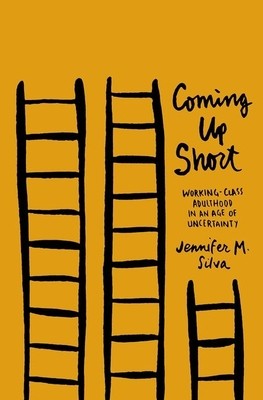
- We will send in 10–14 business days.
- Author: Jennifer M Silva
- Publisher: Oxford University Press, USA
- ISBN-10: 0190231890
- ISBN-13: 9780190231897
- Format: 15.5 x 23.4 x 1.3 cm, softcover
- Language: English
- SAVE -10% with code: EXTRA
Reviews
Description
What does it mean to grow up today as working-class young adults? How does the economic and social instability left in the wake of neoliberalism shape their identities, their understandings of the American Dream, and their futures?
Coming Up Short illuminates the transition to adulthood for working-class men and women. Moving away from easy labels such as the "Peter Pan generation," Jennifer Silva reveals the far bleaker picture of how the erosion of traditional markers of adulthood-marriage, a steady job, a house of one's own-has changed what it means to grow up as part of the post-industrial working class. Based on one hundred interviews with working-class people in two towns-Lowell, Massachusetts, and Richmond, Virginia-Silva sheds light on their experience of heightened economic insecurity, deepening inequality, and uncertainty about marriage and family. Silva argues that, for these men and women, coming of age means coming to terms with the absence of choice. As possibilities and hope contract, moving into adulthood has been re-defined as a process of personal struggle-an adult is no longer someone with a small home and a reliable car, but someone who has faced and overcome personal demons to reconstruct atransformed self. Indeed, rather than turn to politics to restore the traditional working class, this generation builds meaning and dignity through the struggle to exorcise the demons of familial abuse, mental health problems, addiction, or betrayal in past relationships. This dramatic and largely unnoticed shift reduces becoming an adult to solitary suffering, self-blame, and an endless seeking for signs of progress. This powerfully written book focuses on those who are most vulnerable-young, working-class people, including African-Americans, women, and single parents-and reveals what, in very real terms, the demise of the social safety net means to their fragile hold on the American Dream.
EXTRA 10 % discount with code: EXTRA
The promotion ends in 16d.12:05:41
The discount code is valid when purchasing from 10 €. Discounts do not stack.
- Author: Jennifer M Silva
- Publisher: Oxford University Press, USA
- ISBN-10: 0190231890
- ISBN-13: 9780190231897
- Format: 15.5 x 23.4 x 1.3 cm, softcover
- Language: English English
What does it mean to grow up today as working-class young adults? How does the economic and social instability left in the wake of neoliberalism shape their identities, their understandings of the American Dream, and their futures?
Coming Up Short illuminates the transition to adulthood for working-class men and women. Moving away from easy labels such as the "Peter Pan generation," Jennifer Silva reveals the far bleaker picture of how the erosion of traditional markers of adulthood-marriage, a steady job, a house of one's own-has changed what it means to grow up as part of the post-industrial working class. Based on one hundred interviews with working-class people in two towns-Lowell, Massachusetts, and Richmond, Virginia-Silva sheds light on their experience of heightened economic insecurity, deepening inequality, and uncertainty about marriage and family. Silva argues that, for these men and women, coming of age means coming to terms with the absence of choice. As possibilities and hope contract, moving into adulthood has been re-defined as a process of personal struggle-an adult is no longer someone with a small home and a reliable car, but someone who has faced and overcome personal demons to reconstruct atransformed self. Indeed, rather than turn to politics to restore the traditional working class, this generation builds meaning and dignity through the struggle to exorcise the demons of familial abuse, mental health problems, addiction, or betrayal in past relationships. This dramatic and largely unnoticed shift reduces becoming an adult to solitary suffering, self-blame, and an endless seeking for signs of progress. This powerfully written book focuses on those who are most vulnerable-young, working-class people, including African-Americans, women, and single parents-and reveals what, in very real terms, the demise of the social safety net means to their fragile hold on the American Dream.


Reviews